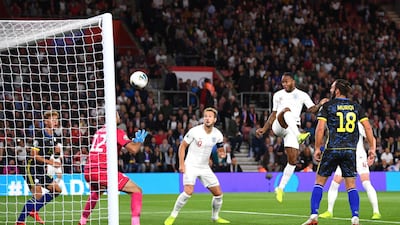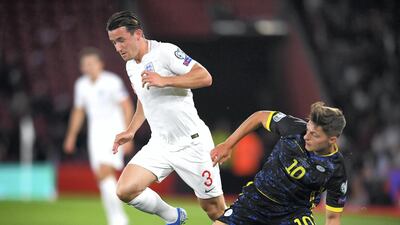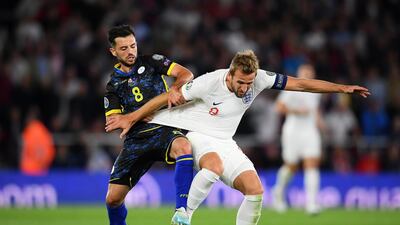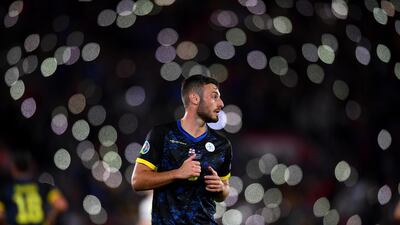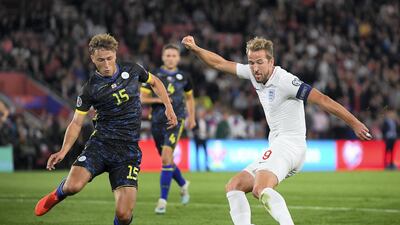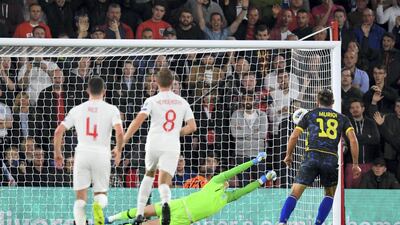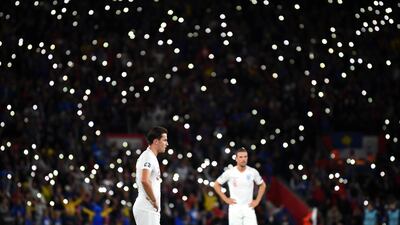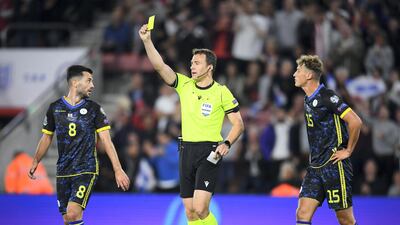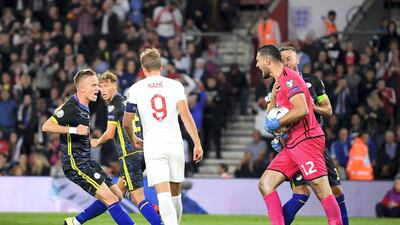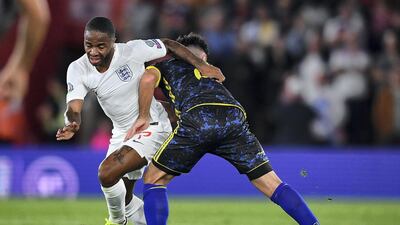“We had a team meeting in Pristina and our coach showed us a movie about how this team had come together,” explains Flamur Kastrati when asked to recall playing in Kosovo’s first official game in 2014.
“The coach picked up some earth between his hands and said: ‘Show the country what we are fighting for’. That made us so inspired. We took the bus to Mitrovica, a 30 minute drive away, for the game. It took much longer.”
Mitrovica, in northern Kosovo, is a divided city with Serbs living on one side of the river and Kosovans on the other.
“It’s an unofficial border with a small bridge dividing the city,” says the forward, 27.
“Nobody I know would cross the bridge. People were walking to the game from miles around. The roads were blocked. People were kissing the bus, the police couldn’t clear a path for us. They were falling to their knees and crying when they saw us. The stadium was sold out. We were the best team but drew 0-0 (against Haiti). Maybe somebody didn’t want us to win that night.
“I was on the bench and came on for the last 15 minutes. It was an incredible feeling but people were scared too. We noticed something flying above us and were worried. It was a Kosovan flag from a small plane or helicopter, but we were worried because there was a lot of tension.”
Where we are speaking seems a world away. The sun is setting over the North Atlantic in Ole Gunnar Solskjaer’s hometown of Kristiansund, Norway. The population of the town is only 25,000 yet the local football team is in Norway’s top-flight. Christian Michelsen, whom Solskjaer has known since childhood, is doing an excellent job as coach. The team enjoyed their July friendly against Manchester United in Oslo. Michelsen has some local players from a town which produces footballers and he’s recruited well from further afield.
Kastrati is one. His calm life now is in contrast to his background but as the Norwegian domestic season winds down, he’s looking forward to one game – the Euro 2020 qualifier against England in Pristina on Sunday.
“Kosovo against England is a huge event for us. In Kosovo we have a lot of love for England and the US because they helped us. Tony Blair is popular and Bill Clinton too. There’s a statue of Clinton in Pristina, the capital.”
Kastrati tells his story. “My parents are from a city 40 minutes from Pristina. My father is one of six boys. Before the war really started the oldest brother moved to Norway in 1988. Norway understood the situation and allowed Kosovan people in. He could see a lot of problems coming. You learned Serbian and Russian at school. Kosovan was not taught but families spoke it at home. The language was pushed underground.
________________
September, 2019: England 5-3 Kosovo
________________
“My father decided to follow his brother to Norway in 1989. He wanted a better life; he found a really tough life. He needed to learn Norwegian and he couldn’t even speak English so he couldn’t communicate with people. My father had between five and eight jobs per day just to survive. He cleaned nightclubs, he delivered pizza, he worked in construction. He had to earn money not just for us but for the family in Kosovo. Dad felt he made the right decision to leave. Other members in our family stayed and they had to walk away from their country, up into the hills and down into Albania to feel safe.”
Kastrati’s grandfather told him about fleeing from Serb paramilitaries as 1.2 million Kosovan Albanians were displaced.
“Grandfather told me the story with a voice that I cannot even begin to describe,” Kastrati says. “He was a huge man, an important figure politically in his city. He got beaten a lot of times but he was too proud to leave. A lot of his friends lost their lives.”
Kastrati was born in November 1991 in Oslo, but has always been made aware of his roots. “My name Flamur means ‘flag’. When you marry in Kosovo you raise a flag because the family is proud. When my parents got married the flag went up. A Serbian patrol drove past the house and heard a lot of noise – it was a wedding day. They went to take the flag and to disperse the wedding. The guests objected. My uncle was a police officer. A shootout started. Nobody got killed but my uncle had a bullet wound. My parents’ marriage was known locally as ‘the bloody wedding’. My name symbolises what happened at the wedding.”
Kastrati is grateful for his upbringing in Norway. “It’s the country which gave me a life, an education to make me who I am today,” he explains. “I’m thankful for this. I feel Kosovan and I feel Norwegian. I go to Kosovo three or four times a year.”
As a professional footballer, he can afford to. “I was not good at school, the boy at the back of the class with a ball at his feet who waited for the breaks. I supported AC Milan because of Andriy Shevchenko. I started playing in a club called Grei in a tough part of Oslo with a large immigrant population. There were people from Africa, from Kosovo and even from Serbia. We were not best friends. It is built inside you and will always be there.”
Kastrati remembers the war years. “The situation became desperate in Kosovo,” he says. “We went to demonstrations in Oslo and I was on my dad’s shoulder singing the Kosovan anthem to make Norway and the world wake up to what was happening. My father didn’t tell me so much. He spoke to his family every day. He wanted to go back and fight but my mother talked him out of it. We needed him for our family.”
Despite this, Kastrati’s football went well. "I joined Skeid, a second division club with a reputation for promoting youth,” he says. “My coach told me: ‘If you have the hunger and professionalism, you will become big’. Those words opened my eyes and I decided to go all in. I played in the Norway Cup, a big youth tournament. I scored a lot of goals and a Danish scout told me that Chelsea wanted to see me for one week. I was so happy. I went there, three of us from Kosovo.
“One was Valon Berisha who scored twice against England recently [in the 5-3 defeat at Southampton in September]. Good lad, good player. He’s at Lazio. At Chelsea we met the really top young players in the world. Lots of Spanish, Portuguese, Brazilian and English at Chelsea. My coach asked: ‘How many of these are going through to the first team?’
The trial wasn’t in vain.
“I had a boost from that trip to Chelsea and the physical side and the tempo stood out for me.” There was more interest. “An English agent called and took me to Derby County. I was prepared for the physical side of football. Derby wanted me but Skeid wanted too much for me. Nothing happened.”
Kastrati represented Norway at all levels from the U19s to the U23s. Twente Enschede signed him under coach Steve McClaren, who impressed him greatly.
Kastrati then went to Germany’s second tier with Osnabruck, Duisburg and Erzgebirge before returning to Norway in 2013. “I went to Stromsgodset and found happiness in football again. We won the league, beating Rosenborg. I loved it. We played in the Europa League against big teams.”
That year, 2013, saw him contacted by neighbouring Sweden.
“Things started to happen with the Kosovan national team,” he recalls. “Albert Bunjaki was an assistant manager in Sweden and he was asked if he could help with the national side.”
Bunjaki left Kosovo in 1991 after a conscription call from the Yugoslav army. He was sentenced to 20 years’ imprisonment in absentia and changed his name when he arrived in Sweden where he continued to play and then manage.
“He did so much,” Kastrati says. “He took the old seats from a stadium in Sweden and drove them back to Kosovo. He scouted and watched players. He would become Kosovo’s manager until 2017. He contacted me and I didn’t know what to do. I’d played for Norway at under 21s. I loved Norway, I loved Kosovo. Norway had a national team, Kosovo didn’t.” But Kastrati accepted the offer to become a Kosovan international.
Like Catalonia, Kosovo had played unofficial friendly games, the first against Albania after the break-up of the former Yugoslavia in 1993. They also played after the Kosovo war in 2002 and the declaration of independence in 2010. But it wasn’t until 2014 that they were recognised by FIFA.
“Before that we played friendly games against clubs.
“Then we had that first game against Haiti in Mitrovica on March 5. I played in eight friendly games and two qualifiers for the World Cup against Iceland away and Ukraine at home.”
Almost all Kosovo’s players don’t play in Kosovo.
“Kosovo produces good footballers and a lot of players from higher leagues started to show interest in playing for Kosovo once we started competitive games,” he explains.
“Several players switched from Albania to play for Kosovo. Albania had previously been the closest thing we’d had to a national team. Many were players who had left as children because of the war. There are half a million Albanians in Switzerland, many of them Kosovan Albanians.”
Kosovo’s population is just 1.8 million (70 per cent are below the age of 35) but there’s a large diaspora of almost a million in Switzerland, Germany and the United States. One, Xherdan Shaqiri, who was born in the same district as Kastrati’s family, scored the winner for Switzerland against Serbia in the 2018 World Cup finals.
Kastrati's manager Michelsen thinks that he can get back into the Kosovan team if he continues playing as he is. "That’s my ambition and if I have a season like I’m having now I’m 100 per cent sure I’ll get back in there,” he says. “I speak to the players every day. We have a WhatsApp and Snapchat group. We can’t wait to play England again.”


